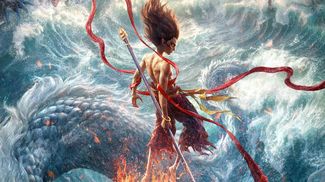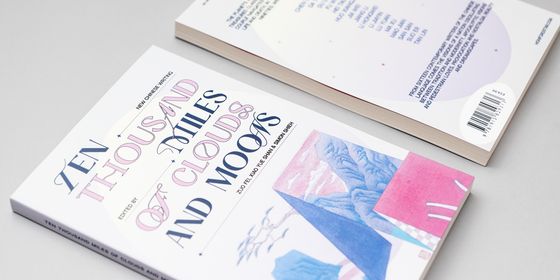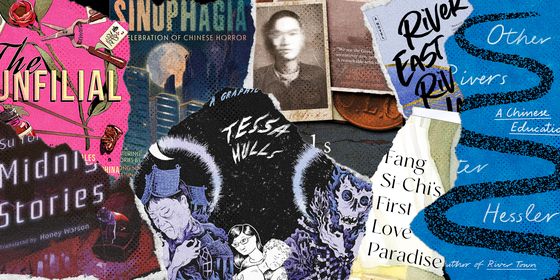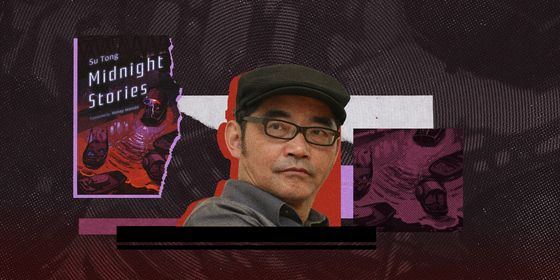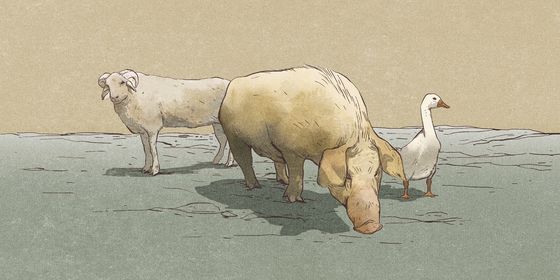Short story from our issue, Grape Expectations
Author: Jiang Yitan 蒋一谈
Jiang Yitan is a novelist, poet, and children’s book author who graduated in 1991 from the literature department at Beijing Normal University. He has published seven short story collections, including Lu Xun’s Beard, Chinese Carp, and China Story, as well as six poetry collections, including Jieju and Ode to Cats. Jieju is also a form of poetry he advocates, consisting of haiku-like three-line verses written in modern Chinese. Jiang is the recipient of a number of awards, including the People’s Literary Award, the Pu Songling Short Story Award, and the Shanghai Literature Short Story Award.
There were three of us in the lab, and our goal was to extend the life of white mice. To be more precise, we were researching the flaws in the DNA of every mouse, and finding ways to repair each one. Ultimately, we hoped to find the secret to giving mus musculus a longer lifespan. We would selectively mate them, observe their mating cycles and behavior, and test whether the next generation came out a little healthier.
Mice are universally recognized as the best experimental model for human physiology. If this study could take us a significant step toward lengthening the lives of Chinese people, then the mice which died along the way could rest in peace. Our project description sounded like an inspirational motto, but it was the reality of our work: Make every generation of mice live longer than the last! Help each generation of Chinese people live longer than the last!
After we were selected for the experiment, the three of us (the project director named Peng, Chen Jin, and I) all signed a strict non-disclosure agreement prepared by the HR department. This experiment was a state secret. All calculations, drafts, and laboratory data were the property of the state and must never be taken out of the laboratory or disclosed to anyone outside of our team. We read through the restrictions, and the consequences if we were to breach them, and each solemnly signed our name. Following the Chinese custom, we also inked our fingers and imprinted the thick contracts with our fingerprints.
Looking at my bright red thumbprint, I thought of my grandfather. He lived to the age of eighty-nine, making him the longest-lived member of my family. In the end, he rang his own calling bell in the most extreme way possible: by refusing to eat. “Even Chairman Mao…will pass away…I have lived long enough…I want to go now…” These were my grandfather’s last words. The way he chose to die left a mark on me. Even today, something mysterious jolts through me when I think of it.
I didn’t much like our director, Peng. He was vain, and made a lot of enemies. Even though he was already in his fifties, he was still just an associate researcher. He enjoyed firing obscure biology questions at students and young researchers, and a sickly grin would slowly contort his face as they struggled to answer.
He was the famous wellness expert in our institute; he would investigate the secrets to longevity whenever he had time to spare. Maybe that was why he was assigned to lead our research on the lifespan of white mice. I once heard him tell a new graduate student that Peng Zu, the god of longevity who lived to be 500 years old, was his ancestor—and he believed it, too.
Chen Jin had a studious air and didn’t speak much. She had just returned from doing a doctorate in the UK. On the day we signed our contracts, she seemed to be arguing with her boyfriend on the phone. I happened to be passing by, and heard her hissing, “I’m not saying I want to split up…I just don’t know about going back to Chengdu. Let me think about it…” The next time I saw her, she looked very unhappy.
It was the third day of our project. In the lab, Jin was working with her back to me and seemed to be wiping away tears. The mice closest to her had shrunk into the opposite corner of their cages and were blinking their little pink eyes.
“No crying in front of the mice, please, Miss Chen.” It was Peng. “You’ll affect their mood. You know that moods can be contagious. If the mice are upset, they won’t eat or sleep properly, and it will throw the calibration of the experiment.” He frowned, and little fishhooks appeared on his forehead.
“I’m not crying. I haven’t cried in years…” Jin left the room. I started to become interested in my new coworker.
That afternoon, Peng called us together for a meeting. Jin leaned against a work surface, poking her finger through the side of a cage for one of the mice to nibble. Peng sat there like the leader of a major research institute and harped on a few themes, which could all be summarized as: Get the data out quickly! Serve the nation and the people!
I murmured to Jin, “It’s good to be working with you.”
She glanced at me, and said, “You too.”
“We should have dinner sometime,” I said.
She smiled and didn’t immediately reply.
A hundred or more white plastic cages were arranged on the lab benches. One white mouse would live in each. (Though the word “live” was a pathetic joke.) We first numbered every cage: the odd numbered cages housed male mice; the even numbers held the females. We named the mice after their cage numbers for ease of reference: Male One, Female Two, Male Three, Female Four…
We checked the sex of every mouse and paired them off into Mr. and Mrs. Mouse couples, whichever ones we felt would get on well together. Director Peng loved inspecting the reproductive organs of the mice, and called Jin over to stand next to him and take detailed notes. It made me feel sick.
Observing the mice was a major part of our work. Over the last few years, at a conservative estimate, I had dissected several hundred mice. Now, alone in the lab, I stood staring intently at one of our specimens. Every second I stared at that mouse, its lifespan ticked one second shorter. Of course, mine did, too, but that second didn’t matter to me. The mouse and I had lost the same physical time, but biological time was very different for each of us.
In one minute, the mouse’s heart beat 650 times, and it breathed 160 breaths. At three months, the mouse was mature and could parent its first litter. It could be a grandparent at six months, and at two years—well, two years was all the life a mouse had; but it didn’t know that. When it wasn’t sleeping, a white mouse would spend almost all of its time frantically scurrying around (they love those little wheels…), burning through its energy and its cells, scampering towards death. Whereas I could think; I knew that I would eventually die of illness or old age, knew that I would turn into a pile of bones or a pot of white ash. In the face of death, though, there was not much difference between me and the mouse.
No, no, there was. I could dissect the mouse. I could watch it struggle, see its paws twitch, its eyes bulge, feel its breathing gently cease. But I felt no guilt.
It was our lunch break. Peng was outside reading his newspaper in the shade of a tree, and exclaiming, “A bristlecone pine named ‘Methuselah’ is now 4,781 years old. It is still living, still producing cones, and still just as green and leafy as ever; 4,781 years! Phew! Will human beings ever live that long? I would love to see that tree. I’m sure people will live to 5,000 years.”
I sniggered and glanced over at Jin. Her mind was elsewhere, her eyes blank.
“Do you two know how long a sea urchin can live?” Peng’s voice floated in through the window once more.
“Do you know?” I muttered to Jin. It seemed to wake her up.
“He’s testing us again, asking how long sea urchins live.”
“150 years,” she replied evenly.
The director did not hear our answer. He chattered on, more to himself than anyone: “I suppose I should eat more sea urchins, then…Sea urchins, a century and a half. Must be a superfood of some kind.”
“You free tonight?” Jin asked me. I nodded, and walked out to make a call.
I chose an authentic Sichuanese restaurant, in honor of her roots in Chengdu. We didn’t want Peng making anything of it, so I arranged with Jin that we’d leave work separately and meet at the restaurant. Jin came in her white lab coat. She had gone to her locker to change, she explained, and the key had broken off in the lock. We both laughed at the same moment.
Jin liked the restaurant. It was in a Beijing courtyard, with a big red door set in the middle of a long gray wall, and a string of irregularly shaped windows on either side. The paint on the door was peeling, and it was lit by paper lanterns. Above the lintel, in large print, was the restaurant’s slightly alarming challenge: Spicy Enough to Burn Beijing.
A server in a cheongsam stood shivering in the cool autumn air. Her eyes widened in shock at the sight of Jin and she asked timidly, “Are you from the health bureau?” I waved a hand to reassure her, and the professional smile returned to her lips. “Welcome!” she said, in the Sichuan dialect.
As we entered the restaurant, we came face to face with a wooden frieze of the Eight Immortals. Each of the eight was carved out in great detail, but in place of their traditional talismans, all of them were brandishing red chili peppers. Below the frieze was a long stone trough with lily pads floating in the water. Red and white koi swam lazily among the stems. Stepping around the tableau, we found ourselves in a courtyard with covered walkways along the three sides. She ordered, and we settled to talking.
I was curious what had brought her back to China. She said, “It’s the worst recession in fifty years in Europe. A lot of people are out of work. It’s no time to be looking for a job.”
I said I wished her all the best for her new life back in Beijing. She turned to look out at the dusky courtyard, and said, “There’s not much life here, either.”
“You’ll get used to it after a while.”
“If someone could just convince me, I would quit and go back to Chengdu, where my family is. I’d go and live a different life with him.”
“What do you mean?”
Her expression was calm as she turned her eyes back to give me a searching look. “Can you? Convince me?”
“I’m not sure anyone can convince anyone of anything, these days.”
She said nothing.
“How—how long have you been together?” I asked, stuttering a little.
“Eight years.”
“Long time.”
She laid her chopsticks on the table.
“When are you getting married?”
“He wants to do it right away.”
I smiled. “And you?”
“I do…and I don’t…” She sighed. “Women really are a mass of contradictions. It’s no wonder my professors in the UK said that it’s much harder and more time-consuming to dissect a woman than a man.”
“Chengdu’s a nice place to live, I heard,” I said with a smile.
“I feel like a stranger there now.”
Stranger. The word caught something in me. Beijing started to become strange even as I sat there, eating.
“Tell me about your life,” she said, idly. “If you want to.”
“My life…” I shook my head. “I did a bachelor’s, did a master’s degree, worked for a couple of years, then came back to do another degree to see if I could get a better job. When I finished my PhD, I just stayed at the institute. Time goes fast. Five or six years, already, just gone in a flash. These days I’m basically like a train, I follow the same track every day: home, lab, bookstore. I got divorced three years ago. She took the kid. I’m single now.”
At this point, it was starting to sound too much like we were on one of those dates fixed up by a matchmaking agency, so I stopped and smiled, and she smiled too.
“Don’t get me wrong, I like being single. Sometimes, when you get used to living a certain way, you change…”
“Are you trying to use your failed marriage to convince me to leave Beijing?”
I didn’t know what to say to that. “Marriage is a gamble. Unless they’re a god, or a fortune teller, nobody knows.”
I was not exactly experienced at persuading women on matters of marriage. But that night, in that restaurant, for reasons I can’t explain, another me stood in front of me, got right in my face. The other me repeated over and over: You have to convince this young colleague to leave Beijing. This city looks shiny on the surface, but it’s not like that; it’s no place for a woman to struggle. I don’t know what kind of life she would have in Chengdu, but something intuitively told me her happiness there would be greater than whatever she had in Beijing.
It would be better not to end up like me: living alone in a rental apartment in my 30s. Nor like the women around me: marriage, having a child, raising it; up early in the morning for the school run, dutifully leaving early for the afternoon pick-up. You get old so very fast.
I’m too apathetic to reflect on the past, and too lazy to think about the future. I know the reason why I stayed at the lab for so many years wasn’t just due to my limited specialization, but fate had also taken a guiding hand. My father was a surgeon, my mother an anesthesiologist, and I was their only son. At home, my dad cut his ham with a scalpel. I grew up sharpening my pencils and trimming my exercise books with them. When I was seven, my father showed me how to do my first live vivisections of a frog and a pigeon. I discovered long ago that you could get addicted to cutting living things open.
“Did you do biology because you liked it when you were a kid, or because your family made you?” I asked.
“I liked it since I was a kid,” she said, excitement flashing in her eyes.
“Me too.”
“I dissected a frog when I was five, a live one.”
Inwardly, I tipped my hat at her precociousness.
“But I forgot about that dissection. Then when it was time to choose my exam subjects in high school, I heard the frogs croaking in the pond outside my home, and they suddenly awakened this memory of dissection, just like that. It wasn’t anything unusual. The frogs always start to croak at that time of year. But I’ll always thank that frog.”
Now the talk was starting to flow.
“When I was doing my degrees, I always spent longer in the lab than anyone else. Dissecting the animals, seeing how their organs fit together, and the way the blood flowed. I loved it! Was it the same for you?”
I nodded vigorously.
“I would wash the body after dissection, and air-dry it, then sew it up. Make it into a specimen and put it by my bedside. Once, I gave a crow specimen to a female classmate as a gift. She was so scared that she cried! But there were never any good animals to do, nothing outside of the ordinary rats, frogs, pigeons, dogs, cats… We never got a chance to do a human body. Was it the same for you?”
“Exactly the same!” I burst out.
“When I was doing my doctorate in the UK, I finally learned what real dissection was! I got to open up a gorilla, and a crocodile!”
“I’ve never done a gorilla or a crocodile,” I hastily chimed in.
“You have to dissect a crocodile to see just what an incredible animal it is. They crawl, but they also leap. The joints in their tails are unbelievable. They have a spring structure, all these spherical vertebrae fitting cleverly together. The tail is like a pole vaulter’s pole. Do you know how fast crocodiles can move when they strike?”
I shook my head.
“Forty miles per hour! Faster than a zebra can run!” She quickly took a gulp of beer. “It’s such a buzz, cutting open this ancient animal that’s been around for 200 million years.”
Her words and her emotions pulled me into a different level of awareness. Dissection for her wasn’t just an interest, but an infatuation. In my experience, I had always thought that marrying a man who loved dissecting dead bodies was like marrying a cold corpse. Marrying a woman who loved dissection would be the same: a cold corpse. I thought of her boyfriend, that unfortunate man. At the same time, my ex-wife’s form flashed through my mind. Had I ever truly loved her body? No…I suddenly felt hurt by the realization, but I also knew with absolute clarity that my senses were on some level numb to the bodies of women.
Her voice interrupted my thoughts. “The woman I roomed with was a fan of vampire movies. She invited me back to her home one time, this really big, really old house. It must have been as old as her whole clan. After dinner one night, she suddenly asked me if I wanted to see the vampire gallery upstairs. She hadn’t said anything about it all the way to her house. Perhaps she thought I’d be shocked. But that night I was too nervous to go and see it. I had never seen films like that in China. I was scared of vampires…Do you like them?”
I watched her, expressionless.
“Later she showed me a lot of vampire films, in our dorm and at the cinemas in London. It suddenly struck me how much of a gap there was academically between my experience and these students in the West. I liked biology, and I liked dissecting animals, but it never came anywhere near this level, where it bleeds into your fantasies and your culture. I mean, I was always a bit utilitarian about it. I did the job for material satisfaction, not metaphysical satisfaction. What I learned from vampire films is that all of these dissection techniques I had learned were just techniques. I needed to take them and turn them into a craft. I needed to make the scalpel not a scalpel anymore, but a finger on my hand, a finger that lives and moves. Those fountains of blood were the symbol for another kind of life. Later, I found I’d changed…” Her shining eyes grew disappointed, but my interest in her had grown many times over.
“I had to come back to China to make a living. Now that I’m here, I think about those memories nearly every day…I don’t dare to go back to Chengdu…I even want to leave him. I know what our future would be like… He loves me, but he loves me as I was before. And I love him. I don’t want him to get hurt…”
“Have you tried?”
“I don’t feel anything when he touches me. He says I’m always scratching him with my fingernails. I can’t get excited anymore. I can’t control it…”
She poured out her secrets. I felt the same way. In some ways, the people who open up their deepest secrets are the ones who feel the most pain. I raised my drink to her. We touched glasses and tossed the beer back.
We were the last people to leave the restaurant that night. As we left the courtyard, a light breeze swayed the red lanterns hanging by the door. We walked in silence up the quiet alley, as if each waiting for the other to speak.
“Two people who love scalpels,” I muttered.
She let out a long breath into the darkness.
We came to the end of the alley, and in silent accord, turned toward the lab.
Cars whipped by us, urban streamers of light. Tonight they had an unearthly beauty, a familiar beauty which we had not seen for too long. The pop music that blared from the roadside shops sounded sweeter.
We stood at a zebra crossing, waiting for the traffic light. Shoulder to shoulder we stood, neither of us speaking. The wind was blowing, and it whipped her hair onto my shoulder. My right hand was just inches from her left. Our fingers began to move at the same moment, drawing near, guiltily near, until a spark shocked them apart. Then they were snapped together again by a roaring attraction. Finally, they grasped each other tight. At the exact instant the walk signal was preparing to flash, we strode out together onto the crossing, our fingers gripping each other tightly, as sharp as a mouse’s claws.
– Translated by Philip Hand
Author’s Note: The initial inspiration for this short story came from an article about the dissection of crocodiles. I had known about “crocodile tears,” but now I was learning about crocodile tails, and how remarkably they are constructed. Later, as I read more articles on the anatomy of other animals, the image of the female character in the story began to form. I and a lot of my friends feel that sometimes, in certain critical moments, we cannot completely trust ourselves; we need an external force, which we believe to be a hint from fate. I also think, from the bottom of my heart, that the confusions and losses in life actually motivate us to continue searching.
“Convince Me” is a story from our issue, “Grape Expectations”. To read the entire issue, become a subscriber and receive the full magazine. Alternatively, you can purchase the digital version from the iTunes Store.


